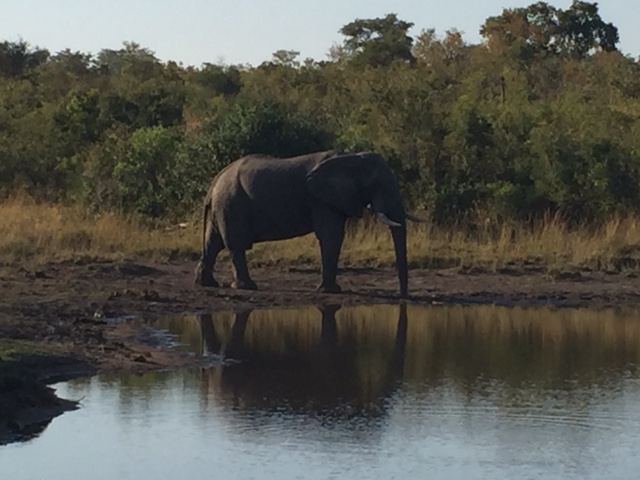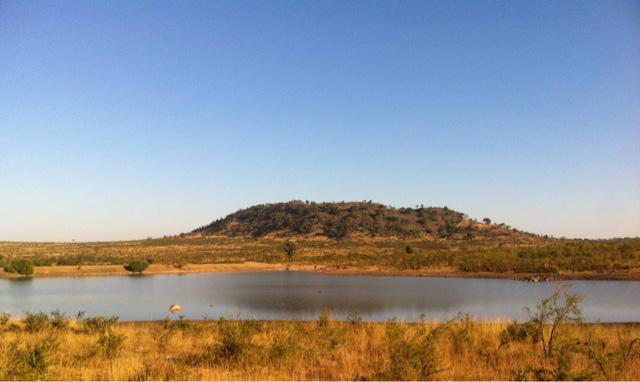Our home for the next five nights. In Kruger we are the ones fenced in as the animals roam free!
At the other side of the swimming pool was a pond with a pod of hippos just lazing around keeping cool in the water.
Our mean safari jeep!
Our great guide Robbie!
Baboons off to their rock for bedtime.
Sunset bush bar!
A heard of over 200 water buffalo on the move!
Waterbuts
A heard of about 20 elephants crossed our path en route to the waterhole for a morning drink.
A mummy hyena and her two tiny pups. Robbie told us they were only about a week old as they were still black although there were signs of some spots beginning to appear. The burrow was right next to the road & they didn't seem bothered by us at all. We watched the pups play, drink from their mummy & fight for her attention. The pregnant hyena leaves her pack and burrows out her new home. She stays there until she gives birth & then until the pups are about six weeks old. She will then return to her original pack. Competition amongst males is rife amongst the hyena packs with male pups often killed to ensure the older males prosper. All the more reason for mum to find a safe haven for her & her pups.
If you look very, very close you can find a leopard laying in the sun.
This shows how great their camouflage is!
White Rhino time. We spotted over 20 rhinos this day. A couple on their own then a few groups of up to four. They are just a spectacular sight. Unfortunately due to poaching Kruger National Park may have no wild rhinos by the year 2024! They loose on average three rhinos per day! Truly heartbreaking but this place is just so huge an area to police, it is near imposible to control this. Their horn is what the poachers are after as Asians believe the horn has healing powers. This is complete nonsense, many tests have been done on rhino horn & no signs of medicinal properties has been found. One of the saddest things is that the park guides, who's job it is to protect the animals, are a huge part of the problem as they let the poachers through the gates for some cash!
More buffalo, some not too impressed we were watching!
Saddle-Billed Stork
Impala are a member of the antelope family. They are a very successful species who adapt well to the hot African desert seasons. We saw them in their hundreds, they are the perfect snack for zebra, lion or leopard but they do hang out in large groups for protection and are very fast runners.
A busy waterhole!
This old guy was all alone! Male elephants are abandoned by the herd once they reach teenage years. They are often on their own but some get together with other males to create their very own batchelor group and will only join a group of females during mating.
These vultures are ready to feast on the leftovers of some other animals kill!
Southern Ground Hornbill.
These are one of the very rare birds of Africa & we were very lucky to spot a happy couple foraging in the grass.
Time for some Andy Wombeldon Magic!!
We have had a great adventure in South Africa and Kruger has shared some truly exceptional sights of the landscapes as well as all the free roaming animals. We can't wait to come back.
There is one thing Africa does exceptionally well and that is sun-sets!
The colour of that sun just makes it one of the most spectacular sights in the world!


















































No comments:
Post a Comment